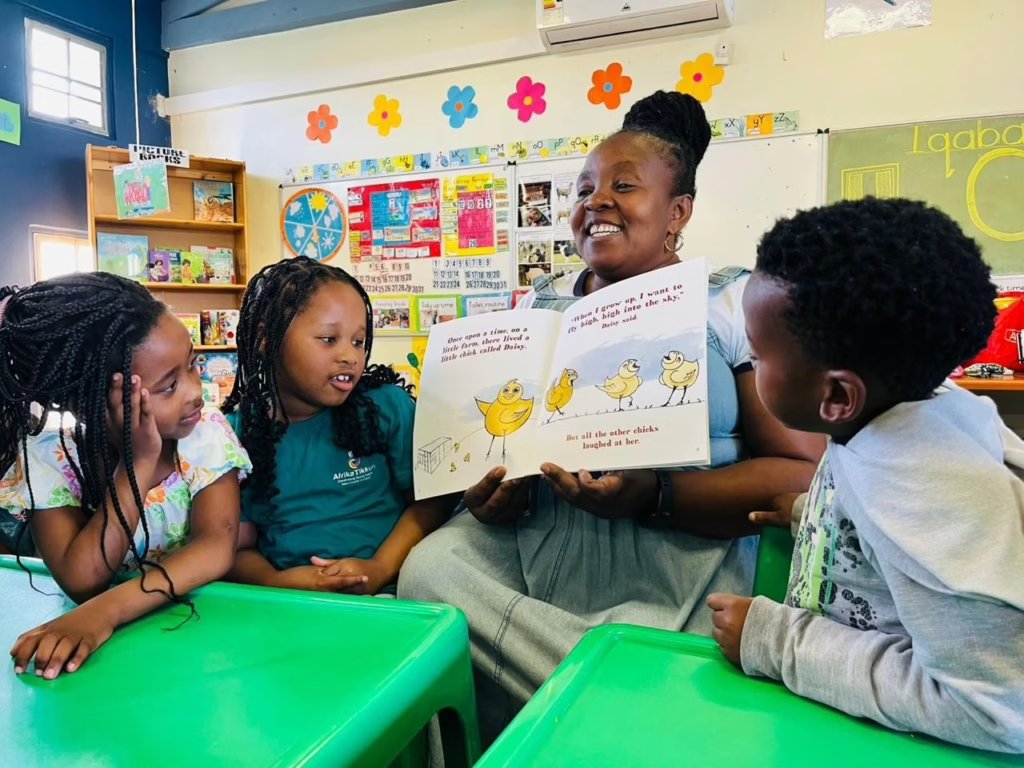By Theresa Michael CEO Afrika Tikkun Bambanani
Books are not just pages bound together. They are doors. Secret passageways. Portals to galaxies, kingdoms, and adventures waiting to be discovered. Every year September is International Literacy Month and we are reminded that when children read, they don’t just stay in the book – they leap out of the book into worlds of wonder, curiosity, and possibility.
Out of the Book, Into the World
Every story a child reads stretches their imagination, inviting them to think differently, solve problems creatively, and dream boldly. Stories don’t just teach children to read — they teach them to wonder. They plant seeds of empathy, courage, and curiosity that grow far beyond the classroom.
Or as Lewis Carroll wrote in Alice’s Adventures in Wonderland:
“Imagination is the only weapon in the war against reality.”
And who could forget C.S. Lewis in The Lion, the Witch and the Wardrobe:
“Once a king or queen of Narnia, always a king or queen.”
Because books don’t just tell stories — they crown children with imagination that lasts a lifetime.

The Power of Reading: What the Studies Say
Research from around the world confirms what every child who has ever been lost in a book already knows: reading shapes the mind, the heart, and even the future.
Imagination and Creativity: A study by the National Literacy Trust (UK, 2020) found that children who read regularly are more likely to use their imagination in problem-solving tasks, and show higher levels of creativity compared to peers who do not read for pleasure.
Empathy and Emotional Intelligence
Neuroscientists at Emory University (2013) discovered that reading fiction improves brain connectivity, particularly in regions associated with understanding others’ perspectives. Quite literally, reading helps children “step into someone else’s shoes.”
Language and Academic Success
According to a 2019 OECD report, children who are daily readers perform significantly better in literacy and numeracy assessments, regardless of their socio-economic background. Just 15 minutes of reading a day can expose a child to more than a million words a year.
Mental Wellbeing: Books also provide comfort. Studies published in the Journal of Applied Social Psychology show that reading reduces stress and strengthens resilience, offering children safe escapes during difficult times.
These findings remind us: when we put books into children’s hands, we are giving them more than stories — we are giving them tools to thrive.
Thinking “Out of the Box” Means Thinking “Out of the Book”
When children open a book, they are no longer limited by their circumstances. A small classroom becomes a pirate ship; a quiet reading corner becomes the African savannah. Reading takes them out of the ordinary and into the extraordinary.
Roald Dahl captured this beautifully in Matilda:
“Somewhere inside all of us is the power to change the world.”
And isn’t that the greatest gift literacy offers? The chance to change not only a child’s world, but the world around them.
Imagination as a Life Skill
In a rapidly changing world, creativity is ranked by the World Economic Forum as one of the top five skills children will need for the future workplace. Reading — especially fiction — nurtures that creativity. It develops flexible thinking, empathy, and resilience. In other words, the very skills that employers, innovators, and leaders of tomorrow will require.
As J.K. Rowling reminded us in Harry Potter and the Prisoner of Azkaban:
“Happiness can be found even in the darkest of times, if one only remembers to turn on the light.”
That “light” often comes from stories.

The Bond of Bedtime Stories
Beyond the classroom, one of the most powerful acts of reading happens at home. When parents read to their children — especially during bedtime stories — they create a ritual of love, safety, and connection. A child curled up listening to a parent’s voice discovers that stories are not just about words, but about belonging. Bedtime reading strengthens bonds, nurtures trust, and leaves memories that last a lifetime. Studies show that children who are read to regularly not only develop stronger literacy skills, but also greater emotional security.
As Dr. Seuss so perfectly wrote:
“You’re never too old, too wacky, too wild, to pick up a book and read to a child.”
Stories Beyond Books: The Power of Storytelling
Not every family has the means to fill their homes with books — but stories live far beyond the page. Long before books were printed, stories were told around fires, passed down from grandparents, shared under starlit skies. Storytelling is universal: tales of animals that talk, heroes who triumph, and lessons wrapped in laughter. These stories nurture imagination just as powerfully as books.
In many homes, children fall asleep not to printed words, but to the sound of a parent or grandparent’s voice — telling a memory from childhood, a traditional folktale, or ending the day with a gentle lullaby. These moments remind us that the heart of literacy is not just about reading words, but about passing on meaning, rhythm, culture, and love.
As an old proverb reminds us:
“Stories told at night make hearts grow light.”
And whether written in books or spoken aloud, stories escort children into the world of imagination.
“When children read, they don’t just think outside the box — they dream out of the book.”
So let us celebrate this Book Week with joy. Let’s encourage every child to turn the page, open the door, and step into the magical adventure of literacy. Because inside every book, and every story told, is a world waiting to be lived.

